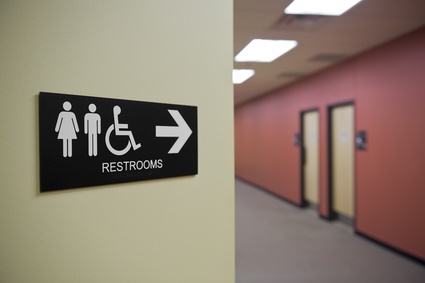Q: The North Carolina law that removes protections for LGBT individuals and would require transgender people to use the restroom of their sex at birth has been in the news a lot lately. This has many of us are wondering what employers should do if an employee says they are transgender and plan to transition?
A: These are still somewhat uncharted waters. But in my opinion if you have more than 15 employees and are therefore subject to the 1964 Civil Rights Act, you should assume that –-even though they’re not specifically mentioned in the law– transgender employees have the same protections from discrimination and harassment as other protected classes. That means you should proceed with care, educate yourself on the subject and maybe get some expert advice if you have no HR professional on staff.
As is the case with the general public, the biggest sticking point in the workplace seems to be the use of restrooms, more specifically women’s restroom use by those transitioning from male to female. Co-workers who may otherwise be accepting of a transgender colleague may balk when it comes to restroom use. So I would focus my attention on how handle that issue. Both the Equal Employment Opportunity Commission (EEOC) and OSHA (yes OSHA, I was surprised too) have issued some helpful guidelines specific to restrooms you should check out.
You might hear in the news that it’s still unclear whether current law applies to transgender individuals, and that more clarification is needed. But don’t buy it. I think it’s abundantly clear that they are protected. In these quotes, the EEOC doesn’t mince words:
- Gender-based stereotypes, perceptions, or comfort level must not interfere with the ability of any employee to work free from discrimination, including harassment. As the Commission observed: “[S]upervisory or co-worker confusion or anxiety cannot justify discriminatory terms and conditions of employment. Title VII prohibits discrimination based on sex whether motivated by hostility, by a desire to protect people of a certain gender, by gender stereotypes, or by the desire to accommodate other people’s prejudices or discomfort.”
- Like all non-discrimination provisions, these protections address conduct in the workplace, not personal beliefs. Thus, these protections do not require any employee to change beliefs. Rather, they seek to ensure appropriate workplace treatment so that all employees may perform their jobs free from discrimination.
The workplace is a microcosm of society. And as society struggles to cope with cultural changes and figuring out what’s fair, much of the experiment is actually taking place in the workplace. Welcome to the future.
Not intended as legal advice.
©Copyright Eva Del Rio
Eva Del Rio is creator of HR Box™ – tools for small businesses and startups. Send questions to Eva@evadelrio.com



